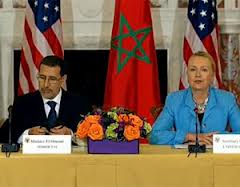
The Future of the US-Moroccan Alliance
 Morocco, the United States’ oldest ally, was not immune to the fervor that swept the Islamic world last week. Protests broke out in front of the US consulate in Casablanca over the film The Innocence of Muslims, which ignited popular uproar in almost every country in the region. While these protests were highly organized and largely peaceful, they indicate a deepening resentment toward the US just as the two countries begin negotiating a closer partnership.
Morocco, the United States’ oldest ally, was not immune to the fervor that swept the Islamic world last week. Protests broke out in front of the US consulate in Casablanca over the film The Innocence of Muslims, which ignited popular uproar in almost every country in the region. While these protests were highly organized and largely peaceful, they indicate a deepening resentment toward the US just as the two countries begin negotiating a closer partnership.
Although the US and Morocco can trace their diplomatic relationship to a Treaty of Friendship in 1777, the current status of their alliance was developed in the aftermath of 9/11. As a moderate Muslim country with a young, pro-American monarch, Morocco was an attractive partner for US counterterrorism efforts abroad. Morocco used the increased attention to improve its international standing and curb the extremism that had produced a Moroccan aide to the 9/11 attacks.
A result of this partnership in fighting terrorism was a Free Trade Agreement in 2004. The FTA supports “significant economic and political reforms” in Morocco as well as developing new markets for US goods and more than doubling US military assistance to the country.
When the Arab Spring hit Morocco and produced demonstrations known as the February 20th Movement, King Mohammed VI wanted to prevent the kind of massive upheaval seen in neighboring Egypt. He preempted calls for more freedom by independently drafting a new constitution, addressing the protesters’ calls for change while in reality sacrificing very little of his own power.
Since long-term allies of the US continued to face upheaval in the region (most notably in Egypt), the US-Morocco relationship has become important to policymakers. The US-Moroccan Strategic Dialogue that began just last Thursday in Washington, DC is an unmistakable example of Morocco’s elevated role. Despite citing human rights, economic ties and political reform as motivating factors of the meeting, US Secretary of State Hillary Clinton specifically emphasized regional security as a vital issue for both countries.
The benefits for the US of an expanded partnership with Morocco are many, including gaining an ally against terrorism and the growing threat of al-Qaeda in the Islamic Maghreb. Yet it is unclear if the Moroccan people want closer ties to the US. The recent protests over the anti-Islam film highlight cultural and political differences between the Moroccan people and the US, even as relations between leaders remain friendly and productive.
Protesters outside the US consulate on Friday threw rocks and shouted anti-US slogans as Salafists in Salé burned US flags in the street. This uncharacteristic aggression was undoubtedly an expression of frustration over the poor representation of Muslims in the film. On a larger scale though, it was also frustration over the perceived lack of respect by the US towards Moroccans.
From my personal interactions with young, educated Moroccans, two themes emerge about the relationship between the US and Morocco. First, they acknowledge that Morocco is of strategic importance to the US and a partnership that benefits trade and regional security is desirable to both parties. Second, Morocco is often not treated like a partner, but rather a subordinate, and the benefits of a close partnership usually only stay within the palace cronies (though never at the fault of the king).
As the US positions the Moroccan government to be a “leader and a model” in the region, it is important to question what impact popular opinion will have on future negotiations. While many in Morocco may not support closer ties to the US, their influence may be minimal. A US Marine guard at the embassy in Rabat summed it up when he said in response to the demonstrations on Friday, “The king and government made it very clear to the people that they would not put up with any kind of protest against Americans.”
For now, Morocco will remain a stable ally in a region of uncertainty. However, if political reforms stagnate and economic opportunities fail to trickle down, the US may face a much more tenuous relationship with its Moroccan allies.






[…] The Future of the US-Moroccan Alliance […]
[…] political liberalization looks like the better role model. And with a two hundred year history, the American-Moroccan alliance is likely to last and thrive midst the upheaval. printvar dd_offset_from_content = 40; var […]